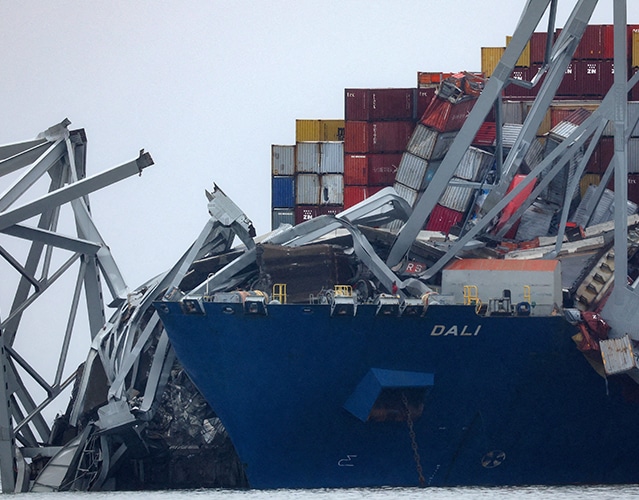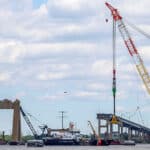The owner, operator and charterer of the container ship that struck Baltimore’s Francis Scott Key Bridge on Tuesday are likely to face lawsuits over its collapse and the people killed or injured, but legal experts say U.S. maritime law could limit the companies’ liability.
U.S. laws pertaining to open-water navigation and shipping, which are created through court decisions and by acts of Congress, could restrict the kinds of lawsuits filed against the registered owner of the Singapore-flagged ship, Grace Ocean Pte Ltd, its manager Synergy Marine Group and its charterer Maersk, and could limit the damages they would have to pay, three legal experts told Reuters.
Representatives for Synergy and Maersk declined to comment on the potential for litigation. Efforts to reach a spokesperson for Grace Ocean were not successful.
The economic damages suffered by the city of Baltimore from the closure of the port, the busiest port for car shipments in the U.S., or by businesses that rely on it and the now-collapsed bridge would not be recoverable through lawsuits, said Martin Davies, director of the Maritime Law Center at Tulane University School of Law.
That’s because U.S. courts have interpreted a 1927 U.S. Supreme Court ruling to mean that any purely economic damages from maritime incidents can’t be recovered from the ship’s owners and operators, Davies and other experts said.
Instead, lawsuits would be limited to injuries, death and property damage or losses, such as claims from the people harmed by the collapse or claims over the damage to the bridge itself, likely brought by government entities.
The lawsuits are likely to be filed in federal court, the experts said. The plaintiffs may also ask a federal judge to “arrest” the ship, and prevent it from leaving the jurisdiction while the litigation plays out, they said.
Those with economic damages might be able to get compensation from insurance policies. Insurers could face billions of dollars in claims, analysts said, with one putting the cost at as much as $4 billion, which would make the tragedy a record shipping insurance loss.
Traffic was stopped on March 26 before the ship, named the Dali, struck the pylon that led to the bridge’s collapse, likely saving lives. But eight people fell into the river, where water temperatures were 47 degrees Fahrenheit (8 degrees Celsius).
The remains of two of the six missing workers were recovered the next day with the remaining four presumed dead. Two workers were rescued, one unharmed and one injured. The ship’s owner, its operator, charterer and even the ship itself could face claims for those injuries or deaths.
Under maritime law, a victim can sue the ship itself, in contrast to laws pertaining to car crashes, and have it sold to satisfy their judgment, said Robert Anderson, a professor at the University of Arkansas School of Law.
But an 1851 law limits the shipowners’ liability to the present value of the ship, which could be in tens of millions of dollars, said Anderson and Baltimore maritime plaintiffs’ attorney Charles Simmons Jr.
Davies and Simmons said they expect the shipowners to petition a federal court for that limitation of liability, and Anderson said the shipowners will likely rely on liability insurance to pay any damages. But if evidence shows that the shipowners were somehow at fault for the crash, they could lose the ability to limit their liability, the experts said.
Questions have arisen about the Dali’s condition when it hit the pylon and problems identified during previous inspections, which could come into play as a court evaluates whether to limit the damages, said Simmons.
“If there was any indication that the ship had pre-existing issues, these guys are not going to get out on a limitation of liability,” he said.
An unusual feature of these claims is that any lawsuits filed on behalf of people injured or killed in the collapse will not be subjected to a Maryland law that caps non-economic damages in wrongful death cases to about $1.4 million, because it isn’t recognized by maritime law, Simmons said.
This article was provided by Reuters.







